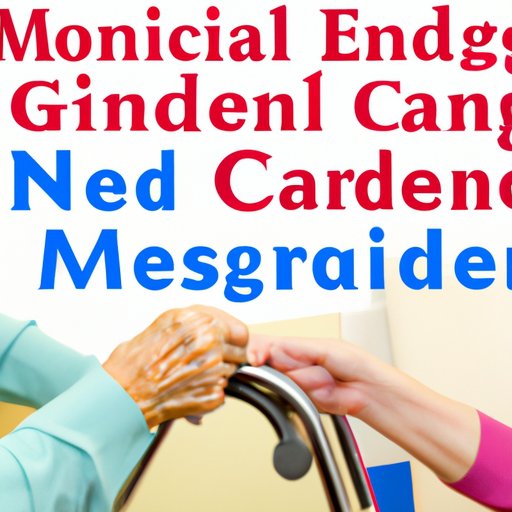An Overview of Medicare Coverage for Nursing Home Care
Nursing home care is an important part of ensuring that seniors receive the care they need as they age. For many people, understanding the coverage options available through Medicare can be a complicated process. It’s important to know what is covered, as well as any additional financial assistance or insurance options that may be available.
What is Covered Under Medicare?
Medicare Part A provides some coverage for nursing home care for short-term stays in a skilled nursing facility. These stays must be medically necessary and are typically limited to up to 100 days per benefit period. The amount of coverage depends on the type of care received, as well as the length of stay.
Medicare Part B does not provide coverage for nursing home care but may cover certain medical services related to nursing home care, such as physical therapy, occupational therapy, and speech therapy.
Eligibility Requirements
In order to be eligible for Medicare coverage for nursing home care, you must meet certain criteria. You must be 65 years of age or older, or disabled, and you must have been admitted to a skilled nursing facility following at least a three-day stay in a hospital. In addition, you must require skilled nursing care or rehabilitation services that can only be provided in a nursing home.
Costs and Payment Options
The cost of nursing home care can vary greatly depending on the type of care needed and the location. Generally, Medicare covers up to 100 days of care in a skilled nursing facility after you meet the deductible. After the first 20 days, you will pay a copayment for each day of care. For the remaining 80 days, you will pay a daily coinsurance amount. If you require more than 100 days of care, you will be responsible for the full cost.
You may also be able to use private insurance or long-term care insurance to help cover the cost of nursing home care. Additionally, Medicaid may be an option if you meet the eligibility requirements.

Financial Assistance Options When Paying for a Nursing Home
Private Insurance
Some private health insurance policies may provide coverage for nursing home care. However, it is important to check with your provider to verify the specifics of your policy. Depending on the plan, private insurance may pay for all or part of the cost of nursing home care.
Long-Term Care Insurance
Long-term care insurance is designed to help cover the cost of long-term care services, including nursing home care. Policies vary, so it is important to read the fine print before committing to a policy to make sure it meets your needs. Generally, long-term care insurance pays for a certain number of days or dollars of care per year.
Medicaid
Medicaid is a joint federal and state program that helps low-income individuals pay for medical expenses, including nursing home care. To qualify, you must meet certain income and asset limits. Additionally, some states may require you to spend down your assets to qualify for Medicaid coverage.
Understanding the Different Types of Medicare-Covered Nursing Home Care
Skilled Nursing Facilities
Skilled nursing facilities provide 24-hour medical and nursing care for individuals who require ongoing care and monitoring. Medicare Part A may cover up to 100 days of care in a skilled nursing facility if certain criteria are met. This type of care is often referred to as “custodial care.”
Inpatient Rehabilitation Facilities
Inpatient rehabilitation facilities provide intensive physical, occupational, and speech therapy for individuals recovering from an illness, injury, or surgery. Medicare Part B may cover up to 90 days of care in an inpatient rehabilitation facility if certain criteria are met.
Hospice Care
Hospice care is specialized care for individuals with a terminal illness. This type of care focuses on providing comfort and support rather than curative treatment. Medicare Part A may cover hospice care in a nursing home if certain criteria are met.
Exploring Long-Term Care Insurance and Its Role in Nursing Home Care
Benefits of Long-Term Care Insurance
Long-term care insurance can provide coverage for nursing home care, as well as other types of long-term care services, such as home health care and assisted living. Policies vary, but generally, long-term care insurance will cover a portion of the cost of care.
Additionally, long-term care insurance may provide benefits that are not available through Medicare, such as coverage for care in an adult day care center or respite care. This type of insurance can also provide coverage for family members who provide care, allowing them to be compensated for their time and effort.
How to Qualify
In order to qualify for long-term care insurance, you must be in good health and meet certain age requirements. Generally, you must be between the ages of 18 and 85 to qualify for coverage. Some states have higher age requirements, so it is important to check with your state’s insurance department for specific information.
Costs and Premiums
The cost of long-term care insurance varies greatly depending on the type of coverage chosen and the age at which the policy is purchased. Generally, the younger you are when you purchase the policy, the lower the premiums will be. It is important to shop around and compare policies to find the one that best fits your needs and budget.

A Guide to Understanding Medicaid and Nursing Home Coverage
Eligibility Requirements
In order to be eligible for Medicaid coverage for nursing home care, you must meet certain criteria. Generally, you must be a U.S. citizen or a legal permanent resident, and you must meet certain income and asset limits.
In addition, you must require a level of care that can only be provided in a nursing home. This means that you must need assistance with activities of daily living, such as bathing, dressing, and eating, or require constant supervision due to a cognitive impairment.
Types of Coverage
Medicaid coverage for nursing home care varies by state. Generally, Medicaid will cover the cost of care in a nursing home, as well as certain medical services related to nursing home care, such as physical therapy and occupational therapy.
How to Apply
If you think you may qualify for Medicaid coverage for nursing home care, the first step is to contact your state’s Medicaid office to determine your eligibility. Each state has its own application process, so it is important to follow the instructions carefully.
Additionally, you may want to consider consulting with a qualified elder law attorney to ensure that you understand all of your options and that your assets are properly protected. An experienced attorney can provide valuable guidance and advice throughout the process.
Navigating the complexities of Medicare coverage for nursing home care can be overwhelming. However, by understanding the eligibility requirements, payment options, and financial assistance available, you can be better prepared to make informed decisions about your care.
